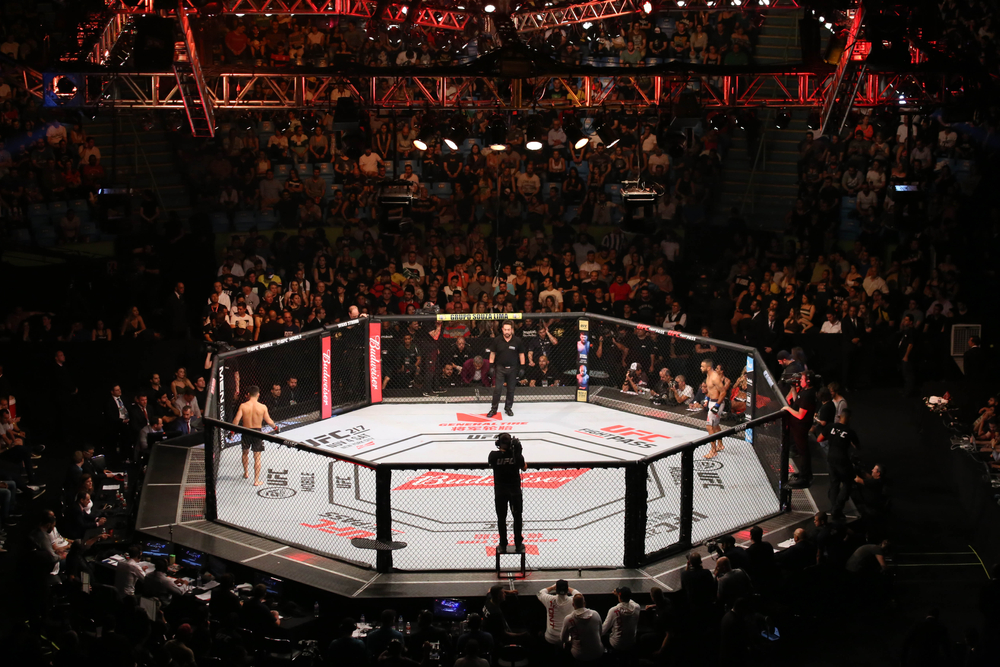The Basics of UFC and MMA
In this section, readers will gain an understanding of the fundamental aspects of UFC and MMA, including the rules that govern the sport within the octagon.
Understanding UFC and MMA
The Ultimate Fighting Championship (UFC) is the leading organization within Mixed Martial Arts (MMA), a full-contact combat sport that allows a wide range of fighting techniques and skills, from a mixture of other combat sports. The competitors of the UFC are skilled in various disciplines, encompassing wrestling, Brazilian Jiu-Jitsu, boxing, kickboxing, and other martial arts.
MMA stands as a dynamic sport, combining elements from multiple martial arts traditions, allowing a unique platform for fighters to test their skills against one another. Competing in various weight classes, fighters aim to rise through the ranks with the goal of becoming a champion in their division.
Rules of the Octagon
The Octagon, UFC’s trademarked fighting arena, comes with a specific set of rules designed to promote fairness and protect the fighters. These rules include:
- Rounds: Non-title matches consist of three five-minute rounds, while title matches and main events typically run for five five-minute rounds.
- Weight Classes: Fighters must weigh in within the limits of their respective weight division before the fight.
- Fouls: A list of prohibited actions includes eye gouging, head butting, biting, and strikes to the groin. Violations can result in point deductions or disqualification.
- Judging: Fights are scored by three judges, and the 10-Point Must System is utilized. The winner of each round receives 10 points, the opponent 9 or fewer based on control, effective striking, and grappling.
- Victory: A fight can end via knockout (KO), technical knockout (TKO), submission, or judges’ decision.
The above regulations ensure that while fighters can utilize a vast array of techniques, there are clear boundaries and safety measures in place.
Understanding UFC Betting Odds
In betting on UFC fights, it’s crucial to comprehend the odds and their various formats, as these influence potential payouts. Grasping the concept of favorites and underdogs, as well as the moneyline, shapes a bettor’s decision-making process.
Types of Odds Formats
There are three main types of odds formats commonly used in UFC betting:
- Moneyline/American Odds: This format is often used in the United States and presents odds with a plus or minus sign. A minus sign indicates the favorite, showing how much one must bet to win $100. Conversely, a plus sign indicates the underdog, showing how much one would win on a $100 bet.Example:
Fighter Odds Favorite (-) -150 Underdog (+) +130 - Decimal Odds: Popular in Canada, Europe, and Australia, decimal odds illustrate the total payout (stake plus winnings) for a $1 bet. The lower the decimal, the higher the likelihood of the fight’s outcome that’s represented.Example:
Fighter Odds Favorite 1.67 Underdog 2.30 - Fractional Odds: Common in the United Kingdom, this format expresses potential profit relative to the stake, shown as a fraction.Example:
Fighter Odds Favorite 4/6 Underdog 13/10
How to Read UFC Odds
Understanding how to interpret UFC odds assists bettors in making informed bets and projecting winnings:
- Favorite and Underdog: The fighter considered more likely to win is the favorite, often denoted with negative American odds or lower decimal and fractional odds. The underdog is expected to have less chance of winning and is marked with positive American odds or higher decimal and fractional odds.
- Moneyline: When betting on the moneyline, one is simply choosing which fighter will win the match. Odds reflect the expected probability of each fighter winning.Reading the Odds:
- American: -150 means bet $150 to win $100, while +130 means bet $100 to win $130.
- Decimal: 1.67 means for every $1 bet, the total return would be $1.67.
- Fractional: 4/6 means for every $6 bet, the profit would be $4.
Bettors should always review the odds formats provided by their chosen sportsbook and understand how each format translates into potential winnings. This knowledge serves as a foundation for successful UFC betting.
Popular Types of UFC Bets
In the UFC betting landscape, fans and bettors can engage in various types of wagers, each offering unique ways to participate in the excitement of mixed martial arts competitions. From straightforward winner picks to more specific bout outcomes, the following bets are commonly placed by UFC enthusiasts.
Moneyline Betting
Moneyline betting is the simplest form of UFC wagering where bettors simply pick the fighter they expect to win the bout. Odds are assigned to each fighter based on their perceived likelihood of winning:
- Favorite: Represented by a minus sign (e.g., -150), indicating the amount a bettor must wager to win $100.
- Underdog: Signified by a plus sign (e.g., +130), showing the amount a bettor wins on a $100 wager.
Over/Under Bets
Wagers on the total number of rounds a fight will last fall under over/under bets. Bookmakers set a line for the total rounds (e.g., 1.5, 2.5), and bettors predict whether the fight will go over or under that number of rounds.
- Over: The fight must surpass the specified round limit.
- Under: The fight must conclude before reaching the specified round count.
Prop Bets
Proposition or prop bets allow bettors to wager on specific events or milestones within a fight that are not directly related to the final outcome. Common prop bets include:
- Method of Victory: Bettors predict how the fight will end (e.g., knockout, submission, decision).
- Fight to Go the Distance: Whether the fight will last all scheduled rounds.
Futures Betting
Futures bets involve wagers placed on outcomes of UFC events that will occur in the future, rather than immediate or upcoming fights. Bettors can typically place these wagers on potential champions within various weight classes or on fighters to win specific high-profile matches that are scheduled to take place later in the year.
Live Betting on UFC Fights
Live betting on UFC fights allows spectators to place bets on matches as the action unfolds. This provides a dynamic betting experience as odds and options can change moment-to-moment during each bout.
Benefits of Live Betting
One of the primary benefits of live betting is the ability to capitalize on the flow of a fight. Bettors can observe patterns and momentum shifts that may not have been apparent before the match started. For instance, if a fighter starts to demonstrate superior stamina or an unexpected strategy, live betting gives one the chance to make immediate bets based on these observations.
- Timeliness: In-play wagers give bettors the chance to exploit time-sensitive opportunities, such as a fighter recovering from a near knockout.
- Adjusting Expectations: As the fight progresses, bettors can adjust their expectations and bets accordingly.
- Hedging Bets: If pre-fight wagers aren’t going as expected, live betting allows bettors to hedge and potentially recoup losses.
Live Betting Strategies
Effective live betting strategies often center around understanding both the fighters and how a match may progress.
- Fighter Conditioning: Bettors should evaluate each fighter’s endurance, as this can greatly influence the likelihood of a late victory.
- Recognizing Patterns: Astute bettors notice patterns, such as a fighter’s ability to deflect or land significant strikes.
A structured approach may involve:
- Preliminary Research: Gather comprehensive data on the fighters’ past performances, strengths, and weaknesses.
- In-match Analysis: Watch the early rounds intensely to detect any deviations from expected tactics.
- Selective Betting: Place in-play wagers on outcomes that reflect real-time observations rather than pre-fight speculation.
This strategic betting may yield more informed and potentially more successful wagers as the fight unfolds.
Key UFC Events and Fighters
The reader should note that significant UFC events often feature title fights and some of the sport’s most renowned athletes, like Conor McGregor and Israel Adesanya.
Major UFC Fights
UFC events are headlined by major fights, many of which are title bouts that draw significant attention from fans and bettors alike. For instance:
- Conor McGregor vs. Dustin Poirier has taken place multiple times, with dramatic results influencing the lightweight division.
- Israel Adesanya’s title fights in the middleweight category are notable for their strategic depth and display of skill.
Renowned UFC Fighters
The Ultimate Fighting Championship (UFC) showcases a roster of elite competitors, including:
- Conor McGregor: Known for his charismatic personality and striking prowess, McGregor has been a key figure in some of the UFC’s most lucrative events.
- Israel Adesanya: As the UFC’s middleweight champion, Adesanya has demonstrated technical striking and defense.
- Dustin Poirier: A top contender in the lightweight division, Poirier is admired for his boxing skills and resilience.
Betting Strategies for UFC
Successful UFC betting hinges on a bettor’s ability to manage their bankroll and analyze fighters and matchups with precision. These are two strategic pillars that can guide wagering decisions and improve the chances of profitability.
Bankroll Management
In betting, managing one’s bankroll is crucial. Bettors should allocate their funds wisely to endure the unpredictability of fight outcomes. A common approach is the unit system, where a single unit represents a percentage of the total bankroll, ensuring bets are proportional to one’s financial capacity.
- Fixed-Unit Betting: Assign a fixed unit amount to each bet.
- Percentage Betting: Bet a consistent percentage of your bankroll.
With this structure, a bettor can absorb losses without exhausting their funds, allowing them to wager on future events.
Analyzing Fighters and Matchups
A thorough analysis of the fighters and the matchups is essential. Bettors must scrutinize various aspects such as fighting style, recent performance, and statistical data.
Fighter Attributes:
- Stand-up and striking skills
- Ground game and takedown defense
- Stamina and fight history (wins by decision, KO/TKO)
Statistics to consider:
| Statistic | Description |
|---|---|
| Striking Accuracy | Percentage of strikes that land |
| Takedown Accuracy | Success rate of taking opponents to the mat |
| Striking Defense | Ability to avoid being hit |
| Takedown Defense | Ability to resist being taken down |
Matchup Dynamics:
- Comparing fighters’ styles
- Anticipating fight flow (likelihood of takedowns, stand-up exchanges)
- Fight location and athlete conditioning
Prop Betting: Includes wagers on specific occurrences like whether a fight will end by decision or a fighter will achieve a knockout (KO). Bettors should consider the likelihood of such outcomes based on fighters’ track records and styles.
By meticulously evaluating these diverse elements, bettors can identify value in the betting lines and make informed decisions.
Understanding Betting Terms and Conditions
When engaging in MMA/UFC betting, it is crucial for bettors to familiarize themselves with the terms and conditions of their chosen betting platform. The terms and conditions outline the rules and requirements that govern the use of the site, including important aspects such as balance management, the right to cancel bets, and withdrawal policies. These rules are in place to ensure fair play and to protect both the bettor and the operator.
- Balance: It refers to the amount of money a user has in their account to place bets. Bettors must ensure they have sufficient funds to cover their wagers.
- Cancellation: Operators reserve the right to cancel bets under certain circumstances, such as errors in odds or if the event is postponed. Bettors should review how cancellations are handled.
- Withdrawal: Withdrawal policies dictate how and when a bettor can take money out of their account. This often includes verification steps to prevent fraud.
Betting platforms provide various tools and limits to help bettors manage their activities responsibly. These may include deposit limits, bet size limits, and self-exclusion options.
| Tool | Description |
|---|---|
| Deposit Limits | Restricts the amount a user can deposit over a given timeframe. |
| Bet Size Limits | Caps the amount a user can wager on a single bet. |
| Self-exclusion | Allows users to voluntarily suspend their account access. |
Bettors must agree to the terms and conditions before placing bets. One should review these carefully to understand their rights and responsibilities on the platform. Being knowledgeable about these terms ensures a more secure and enjoyable betting experience.
Promotions and Bonuses for Betting
 ₦145,600
On first Deposit
1xBet Bonus conditions
₦145,600
On first Deposit
1xBet Bonus conditions
- 300% first deposit bonus of up to NGN145,600
- eSports Era: Place a risk-free bet
- 100% Cashback





 ₦770
Minimum Deposit
Visit
T&C apply, 18+
₦770
Minimum Deposit
Visit
T&C apply, 18+
When venturing into the realm of MMA/UFC betting, bettors often encounter various promotions and bonuses. These incentives are strategic tools employed by sportsbooks to attract new customers and retain existing ones.
1xBet and 22Bet Sportsbook are notable for offering competitive promotional deals. Typically, they provide a welcome bonus to new users, which might include a match on the initial deposit or a free bet.
For instance, a common structure one might find:
- Welcome Bonus:
- 1xBet: 100% match up to a specified limit.
- 22Bet Sportsbook: A similar match offer upon first deposit.
Regular promotions may also occur, such as:
- Reload Bonuses: Additional deposit bonuses on certain days.
- Free Bets: Credits allowing bettors to place risk-free bets.
- Odds Boosts: Enhanced odds for specific fights or events.
It is imperative that bettors peruse the terms and conditions associated with these bonuses. They contain vital information regarding wagering requirements, minimum odds, and validity periods.
While these companies strive to entice users with these offers, it is the responsibility of the bettor to understand the implications of accepting any bonuses. Each company has distinct rules and advantages for their promotions, carefully designed to enhance the betting experience while encouraging active participation on their platforms.
Responsible Gaming and Support
When engaging in MMA/UFC betting, it’s essential for bettors to practice responsible gaming. Responsible gaming involves recognizing that betting is a form of entertainment and should not be considered a guaranteed source of income.
Tools and Limits: To support responsible betting habits, many betting platforms offer tools such as:
- Deposit Limits: Bettors can control their spending by setting a maximum deposit limit.
- Time Limits: Platforms may provide options to limit the amount of time spent betting.
- Self-Exclusion: Bettors can temporarily or permanently exclude themselves from the betting platform.
Privacy: Reputable betting platforms are built with a focus on protecting a user’s privacy. Personal data is handled in accordance with privacy laws, and secure transactions are a top priority.
Support Systems: For those seeking assistance with their betting habits, support systems are in place.
- Customer Service: Representatives are available to address concerns and provide guidance on responsible betting practices.
- Professional Support: External organizations such as Gamblers Anonymous offer helplines for additional support.
Remember: Betting should always be conducted in a manner that is safe, controlled, and within one’s financial means. If betting ceases to be enjoyable, or begins to have a negative impact on one’s life, seeking help is a strong course of action.
Frequently Asked Questions
Successful UFC betting often requires a nuanced understanding of fighter styles, historical performance, and current form. Bettors are encouraged to conduct thorough research and consider a fighter’s track record, recent injuries, and the context of the fight.
Leading apps for UFC betting include DraftKings, BetMGM, FanDuel, and William Hill. These platforms are valued for their user-friendly interfaces, extensive betting markets, and reliable customer service.
UFC betting odds are typically calculated by expert oddsmakers who analyze a multitude of factors such as fighters’ performance metrics, public betting patterns, and statistical data. Odds are presented in formats like American, Decimal, or Fractional and reflect the implied probability of an outcome.
Accuracy in UFC predictions can be enhanced by studying fight footage, staying updated on fighter conditions and camp news, and understanding the matchup dynamics. One should also consider the weight class and its impact on a fighter’s performance.
Reliable online UFC betting can be found on sportsbooks licensed and regulated in the bettor’s jurisdiction. Websites like Bovada, BetOnline, and SportsBetting.ag are known for their credibility, security measures, and favorable odds.
Before betting on MMA fights, one should evaluate the fighter’s skill sets, physical advantages, recent activity level, and motivational factors. Assessing the coaching staff and training environment can also provide insight into a fighter’s preparedness.
Conclusion - UFC / MMA Betting
Betting on UFC and MMA events has become an increasingly popular form of sports wagering, with its unique set of strategies and considerations. Bettors should always conduct thorough research on fighters, understanding their strengths, weaknesses, and fight histories. Odds provided by bookmakers offer insights but should not be the sole basis for betting decisions.
Key considerations include:
- Fighter Analysis: Evaluating physical attributes, skill sets, and recent performance.
- Styles Make Fights: Matching fighting styles to predict outcomes.
- Injuries and Training Camps: Factoring in any reported injuries or disruptions in training.
When placing bets, it’s important to understand the various types of wagers:
- Moneyline Bets: Who will win the fight.
- Over/Under Rounds: Betting on the duration of the fight.
- Prop Bets: Specific occurrences or non-occurrence within a fight.
Money management is crucial. Bettors are advised to:
- Set a budget.
- Avoid emotional betting.
- Spread bets across multiple fights to mitigate risks.
MMA betting forums and expert analyses can be resources for advice and insights but should be used judiciously. With the right approach, UFC and MMA betting can be both enjoyable and potentially profitable, but it involves risks, like all forms of gambling. Bettors are encouraged to wager responsibly.











































